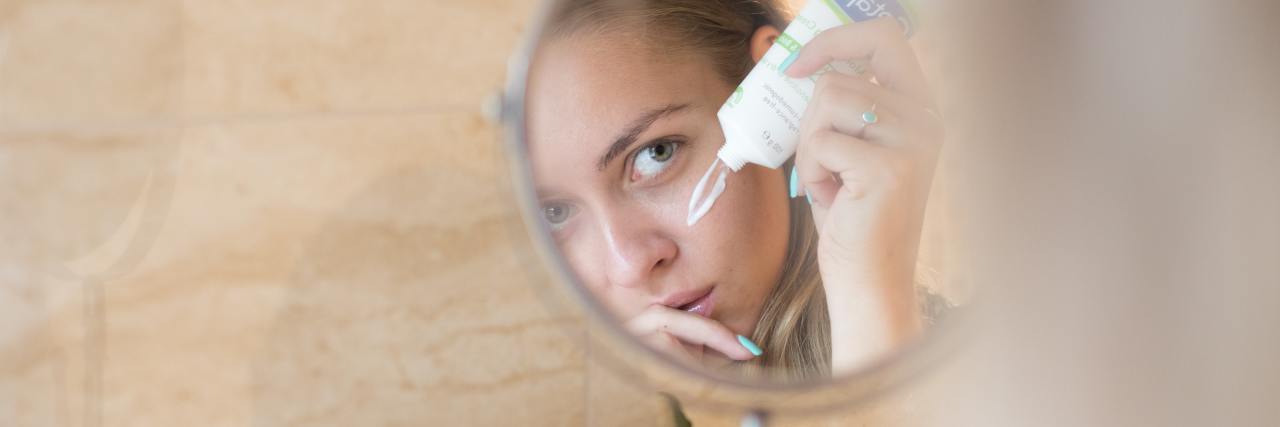It is hard for me to go a day without being told that aging is something I should be afraid of. There are ads that encourage me to hide my grey hair, in addition to journalists who comment cruelly on how politicians and actors age over time. There are acquaintances who gasp in horror with me when I talk about my proliferating wrinkles, as well as elders who respond to my illness by saying, “just wait until you are my age.” The demonization of getting older is well-circulated in our society and elicits fear, shame and unnecessary credit card charges in almost everyone. Even though this fear negatively impacts all people, I think it is important to talk about how anti-aging rhetoric can be especially harmful for me and other young women who live with chronic illness.
1. It makes me worry about having the resources to stay on pace with my peers.
If I am to believe what ads and social media marketing are telling me, then, in order to stay on pace with my peers, my fight against aging needed to have started, like, yesterday. This fight should include: day creams, night creams, facials, teeth whitening, daily collagen intake, exfoliating routines, serums, face masks and preventative botox. In addition, I should have already started dying my hair on the regular to prevent my grey hairs from ever being shown.
To a working and healthy woman, these products and routines are easily passed off as essential to physical self-care, but when you are sick and already have the financial responsibility of budgeting extra dollars for your health, these tasks now seem like one more monetary burden. This burden is hard to simply ignore unless you are willing to risk aging faster than your peers — this risk being scary for many 20-something-year-old women living in a society where there are large social, romantic, political and professional consequences for women as they age.
2. It makes me fear the future.
If what my elders say is true, and “it’s only downhill from here,” then I am absolutely screwed. As a former athlete and fitness enthusiast, I never expected that, in my 20s, I would struggle to get out of bed in the morning. When I lie in bed in agony, reaching for positive thoughts and images to increase my quality of life, I often wonder how I will survive if aging is truly such a constant spiral downwards. If I am to believe what I am being told about aging and this is truly my peak, then I don’t want to know what my future will look like.
3. It has minimized my experience of being ill.
When we are sold the idea that aging is one of the worst things that can happen to us, it is easy to forget that other life tragedies, like illness, may cause suffering too. In the past, when I have shared about my debilitating fatigue to older adults, responses like, “I can’t stay up past 9 either” have been doled out to me. There have been times when I have talked about my frustrations with brain fog, and my troubles have been compared to “having a senior’s moment.” And, unfortunately, in response to my restrictions due to energy levels, I have heard back from my elders, “I can’t walk that far either.”
None of these things have ever been said to me to be malicious; in fact, they have all come from a place of trying to connect, understand and show compassion. However, where these responses miss the mark is that they minimize the fact that these experiences are exceptional for someone in their 20s. To compare a life-altering health condition to the typical process of aging undermines the significance and seriousness of the experience of being ill.
4. It makes it easier for me to accept blame for my disabilities.
I am proud of where the medical system is going, with its focus on preventative health. We live in an amazing time, where we are learning that we can have influence over our health as we get older. At the same time, I have noticed that advertising and social media has taken this positive message and changed it from “we can have influence over our health” to “we should have absolute control over it.” Yes, through lifestyle, we can reduce our risk factors for age-related illnesses and disabilities. However, it is also important to know that no matter how many sit-ups we do, or how much kale we eat, we cannot stop ourselves from aging and we cannot stop ourselves from getting sick.
Despite what we have been told, aging is not a sign that we did something wrong, but instead a regular life experience. My worry is that if disabilities, restrictions and health problems that come with aging aren’t normalized, it will continue to be easy for those with health issues, like myself, to accept blame for their non-age related disabilities and restrictions.
5. It makes me feel like I am missing out on the best time of my life.
When there are so many references to youth being “the best time of your life,” it is hard not to feel like you are missing out on the party of a lifetime. When people remember their 20s, I imagine their minds are filled with images of running, going to the beach, hiking and partying until the sun comes up. Maybe their minds relive starting a family, or going to school, or traveling, or maybe they reminisce about the professional ladders they have climbed. I will remember my 20s differently, however — well, at least the last four of the 10 years. I will remember being in bed, and going to appointments and taking pills. If I buy into the belief that youth is something magical and impossible to recapture as we age, then it would be easy for me to become overwhelmed by sadness.
In the end, however, I feel capable of thinking critically about the information that is being thrown in my direction about aging. I take comfort in the fact that not all the information I am being told about getting older represents the truth. My hope for those who are young and ill, like myself, is that, despite the constant onslaught of anti-aging messaging, they too can see a future that is wonderful and full of life.
Photo by Humphrey Muleba on Unsplash


